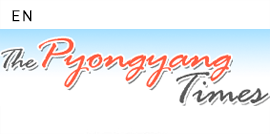Last February, the Unjong Tea Drink Factory was inaugurated in Rangnang District, Pyongyang.
Tea has long been considered a “drink of spirits” which refreshes and calms the mind, as well as an elixir of life to cure all illnesses.
The Korean tea culture has a long-standing tradition.
The tea culture of Korea originated in the period of Three Kingdoms—Koguryo, Paekje and Silla that existed between the 3rd century BC and 10th century AD.
National classics Samguksagi (The Chronicles of the Three Kingdoms) compiled in 1145 and Samgukyusa (The History of the Three Kingdoms) from the mid-thirteenth century and other historical records say that Korean people drank tea from that period.
Samguksagi says that tea began to be grown from the early seventh century and it came into vogue when tea trees were planted on Mt Jiri. A Koguryo tomb mural depicts people drinking tea.
Given the 2 000-year history of the cultivation of tea trees, the fact that Koreans drank tea over 1 400 years ago shows that the tea culture of the Korean nation has a very long tradition.
Later, the tea culture continued to develop through the periods of Palhae and Later Silla. During the Koryo dynasty, the production and popularization of elegant Koryo ceramics facilitated the vogue for Koryo tea which has a special flavour and fragrance.
Among the Koryo ceramics which were richly varied in shape, kind and use, teakettles, tea leaf pots and teacups took a large share. Some historical documents record that drinking Koryo tea in an emerald green celadon cup gave an incomparable flavour.
The tea-drinking custom went on to prevail in the period of the feudal Joson dynasty.
Sinjungdonggukyojisungnam, a national geography book of Korea compiled in 1530, says that tributes from southern regions to the central government included various kinds of teas. A nineteenth century Silhak scholar Jong Yak Yong was nicknamed Tasan (mountain of tea trees) as he loved to grow tea trees on his own and enjoy the delicate flavour of tea.
In that period, the concept of tea gradually expanded to further diversify and develop the tea culture by including drinks made by infusing or brewing fruits and roots of chrysanthemum, matrimony vine, Schizandra chinensis, jujube, insam (ginseng) and other plants.
The excellent tea culture of Korea began to go downhill in the wake of the 1592-1598 Imjin Patriotic War and completely disappeared during Japanese colonial rule over Korea.
The tea culture of the Korean nation entered an era of development under the care of the great leaders of the DPRK.
With an intention to produce tea domestically and supply it to the people, President Kim Il Sung planted tea tree saplings in an experimental plot at his residence and personally selected the right soil suited to acclimatizing them in the country and took detailed measures for conducting research to this end.
True to his noble intention, agricultural scientists chose several tea tree species suitable for the climate and natural features of the country and with stronger resistance to cold and a better yield and established corresponding cultivation and tea leaf processing technologies. Therefore, high quality tea started to be produced on the hills of Kangnyong County, South Hwanghae Province.
In order to make the benevolent care of the President associated with the tea go down in history, Chairman Kim Jong Il named it “Unjong” (benevolence) and saw to it that the plantation was built in a more splendid way.
The Unjong Tea Plantation located in Kangnyong County in the western coast of the country stretches hundreds of hectares. This area is known as a “famous tea-growing place” and “pollution-free tea production base” for it is well ventilated and has the sunshine and annual mean temperature appropriate for the growth of tea trees.
The plantation spreads out on an annual basis and works to improve manuring and cultivation. As tea drinking becomes increasingly popular, the fresh scent of tea can now be noticed not only at public catering facilities but also in many houses.
Unjong tea has rich contents of caffeine and tannin and many vitamins including vitamin C.
Several years ago, the respected Comrade Kim Jong Un took a measure to build a factory that produces tea drinks.
The Unjong Tea Drink Factory recently built in Namsa-ri, Rangnang District, Pyongyang, is a harmonious combination of a production building, subsidiary building and welfare service facilities.
According to Ryom Son Yong, manageress of the factory, now that the tea industry develops towards storing tea using the instant liquid storage method which preserves its traditional flavour, it is a worldwide trend to produce tea drinks and the consumption is constantly going up.
The production building is equipped with the processes for water purification, tea infusing and preparation and packaging and the whole production line is automated and streamlined on a high level.
“What is important in making a good tea is the quality of water used for infusing tea along with that of tea leaves,” said analyst Ri Ye Song. “The water in the area where the factory is located has long been known to have a good quality. However, in order to ensure the perfect water quality, our water purification process has multi-medium, ion-exchange and precision filters.”
The factory focuses efforts on improving product quality in accordance with the trend of development of tea drink production towards preserving natural and nutritive qualities and developing new varieties.
Especially, it increasingly relies on advanced technologies to solve problems arising in the production such as losses of nutritive and aromatic substances and formation of turbid liquid in the wake of refrigeration.
At present, the factory turns out green and black teas and Cholgwanum tea in 0.5L bottles.
The ready-made tea drinks are much sought after by local customers.
“We are now about to finish a research project for producing tea drinks made with gingko and persimmon leaves, insam and Schizandra chinensis which were popular among Koreans in the past,” said Jong Song Hui, a management official of the factory.
More From Pyongyang Times
A delegation of the DPRK Ministry of External Economic Relations led by Minister Yun Jong Ho left Pyongyang by air on April 23 to
April 25, 2024
A delegation of the DPRK Ministry of External Economic Relations led by Minister Yun Jong Ho left Pyongyang by air on April 23 to
Maria Zakharova, a spokeswoman for the Russian Foreign Ministry, warned against the US military aid to Ukraine, Israel and Taiwan
April 25, 2024
Maria Zakharova, a spokeswoman for the Russian Foreign Ministry, warned against the US military aid to Ukraine, Israel and Taiwan
The DPRK health delegation led by Jong Mu Rim, minister of Public Health, returned home by air on April 23 after visiting Russia.
April 25, 2024
The DPRK health delegation led by Jong Mu Rim, minister of Public Health, returned home by air on April 23 after visiting Russia.
The anti-Japanese armed struggle was a revolutionary war to defeat Japanese imperialism and achieve the cause of Korea’s
April 25, 2024
The anti-Japanese armed struggle was a revolutionary war to defeat Japanese imperialism and achieve the cause of Korea’s
The first revolutionary armed forces in Korean history were founded on April 25 1932. In order to defend the dignity of the nation
April 25, 2024
The first revolutionary armed forces in Korean history were founded on April 25 1932. In order to defend the dignity of the nation
Palestinian President Mahmud Abbas, in an interview with the Warpa News Agency on April 20, condemned the US for its unreasonable
April 25, 2024
Palestinian President Mahmud Abbas, in an interview with the Warpa News Agency on April 20, condemned the US for its unreasonable
The idea of “The people are God” and devoted service for the good of the people are the foundation of all lines and policies of th
April 25, 2024
The idea of “The people are God” and devoted service for the good of the people are the foundation of all lines and policies of th
The participants in the second workshop of officials in the field of information work of the Workers' Party of Korea conducted
April 25, 2024
The participants in the second workshop of officials in the field of information work of the Workers' Party of Korea conducted
The Spring National Footwear Exhibition-2024 opened in Pyongyang under the sponsorship of the Ministry of Light Industry.
April 25, 2024
The Spring National Footwear Exhibition-2024 opened in Pyongyang under the sponsorship of the Ministry of Light Industry.
Sea Kumgang Gate is situated about 20 kilometres away from the county town of Kosong in Kangwon Province.The area abounds with fis
April 24, 2024
Sea Kumgang Gate is situated about 20 kilometres away from the county town of Kosong in Kangwon Province.The area abounds with fis
A delegation of the Moscow Zoo of Russia led by Director Svetlana Akulova arrived in Pyongyang by plane on April 22.
April 24, 2024
A delegation of the Moscow Zoo of Russia led by Director Svetlana Akulova arrived in Pyongyang by plane on April 22.
The 2024 Asian wrestling Olympic qualification tournament took place in Kyrgyzstan from April 19 to 21. Choe Hyo Gyong, Mun Hyon
April 24, 2024
The 2024 Asian wrestling Olympic qualification tournament took place in Kyrgyzstan from April 19 to 21. Choe Hyo Gyong, Mun Hyon
In his speech to mark the 214th anniversary of the start of struggle for national independence on April 19, the Venezuelan vice
April 24, 2024
In his speech to mark the 214th anniversary of the start of struggle for national independence on April 19, the Venezuelan vice
The Russian permanent representative to the UN censured the US for protecting Israel in the UN Security Council meeting concerning
April 24, 2024
The Russian permanent representative to the UN censured the US for protecting Israel in the UN Security Council meeting concerning
Russian President Vladimir Putin advanced the task to be tackled by the public health sector in a congratulatory message sent to
April 24, 2024
Russian President Vladimir Putin advanced the task to be tackled by the public health sector in a congratulatory message sent to
The Japanese reactionaries visited the Yasukuni Shrine keeping the name tablets of war criminals to make offerings on April 21.
April 24, 2024
The Japanese reactionaries visited the Yasukuni Shrine keeping the name tablets of war criminals to make offerings on April 21.
Now, extreme weather conditions caused by global warming have unprecedentedly frequented the world, followed by continuous
April 24, 2024
Now, extreme weather conditions caused by global warming have unprecedentedly frequented the world, followed by continuous
Farmers moved into new dwelling houses in the villages of the Sangi Industrial Crop Farm of Kujang County, North Phyongan
April 24, 2024
Farmers moved into new dwelling houses in the villages of the Sangi Industrial Crop Farm of Kujang County, North Phyongan
The second workshop of officials in the field of information work of the Workers' Party of Korea took place at the People's Palace
April 24, 2024
The second workshop of officials in the field of information work of the Workers' Party of Korea took place at the People's Palace
Ahmed Abu al-Gheit, secretary general of the League of Arab States, on April 17 said that massacre committed by Israel should be
April 24, 2024
Ahmed Abu al-Gheit, secretary general of the League of Arab States, on April 17 said that massacre committed by Israel should be
More Articles







